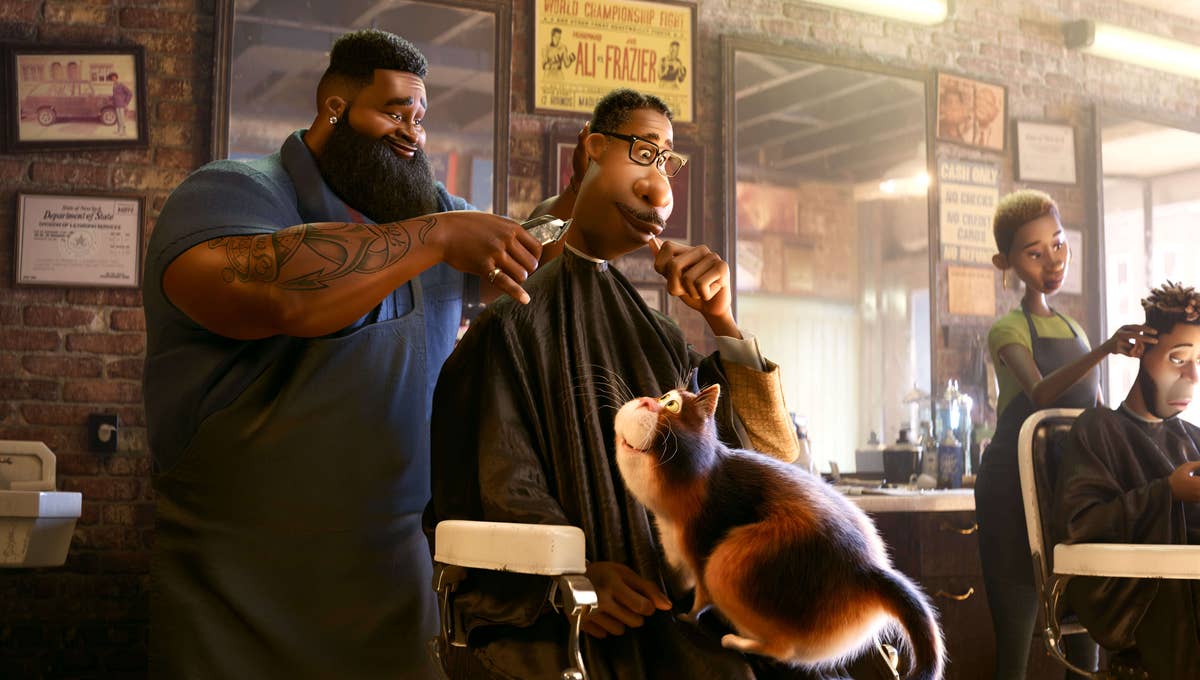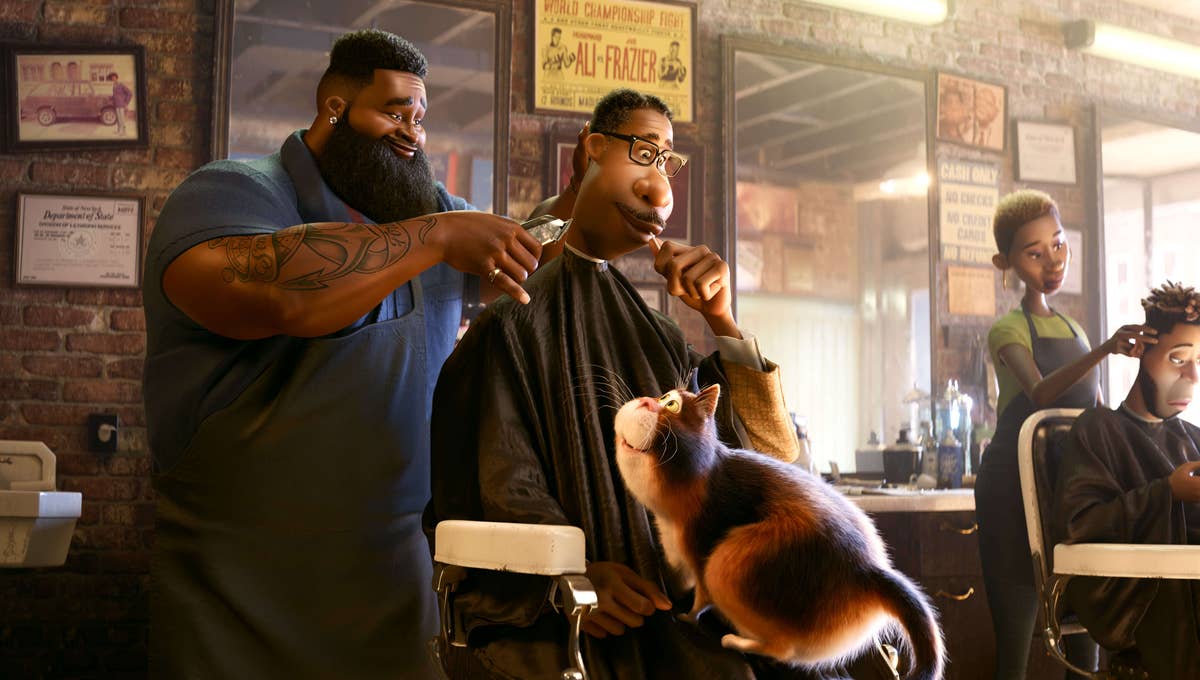Like many of you, part of my holiday was spent watching Pixar’s latest entry into the hyper-specific genre of “movies that make you cry very hard and look at life in a new way,” Soul. The film was wonderful in many respects, and I really enjoyed it (and cried a lot!), but it was also a new entry in another extremely specialized canon of films: “protagonist of color spends most of the movie in another body/species.” And so, the success and beauty of Soul as a film is certainly tempered by the fact that this film, which has so much to say about mindfulness and life, wasn’t mindful of the negative trope it was adding onto.
Before we go further, spoiler warning. We’re going to talk about the movie’s ending and big twists, so if you haven’t seen it, be warned.
Soul is the story of Joe Gardner (voiced by Jamie Foxx), a struggling Black jazz musician whose whole life up until now has been devoted to music. On the day he finally hits his big break (also the same day he gets an offer for a nice job as a full-time teacher), he falls into a manhole and goes into a coma, about to die. Now just a soul, he refuses to go to the great beyond and ends up in the great before, where souls are given their personalities and find their spark before going to Earth.
In the “You Seminar,” Joe is mistaken for a mentor, a soul of someone who has lived and who will teach a new soul to appreciate life and find their purpose so they are ready to live, and he’s paired with Soul 22 (voiced by Tina Fey), who has been there for eons, never having found her spark or a reason to want to live on Earth because she (somewhat rightly) thinks life sounds uncomfortable and horrible. Joe and 22 conspire to get him back to Earth and to his body … and they sort of achieve it, but 22 gets pulled along, which results in Joe’s soul in the body of a cat and 22 in Joe’s body.
So, that’s where we hit what many refer to as “the Tiana Problem,” wherein movies with BIPOC leads don’t allow their lead characters to actually exist in Black or brown bodies for most of the film. The key example here is The Princess and the Frog, where Tiana, hailed as Disney’s first Black Princess, is a frog, not a Black woman, for most of the movie. This happens in Brother Bear, Spies in Disguise, and even to a lesser extent in films like The Emperor’s New Groove and even Coco. It doesn’t even stop at race. In Pixar’s “SparkShort,” Out, which was hailed as having Pixar’s first gay lead character … that character spent most of the runtime as a dog.
Now, in Soul, we see Joe onscreen a lot. But for most of the time, we see a Black man’s body with the voice of a white woman coming out of it. And yes, 22 doesn’t technically have a race or gender as a “soul,” but she’s voiced by a white actress. Add in that this is Tina Fey, whose history with race is fraught, and that Joe is a cat for a lot of the movie, when he’s not a cute blue blob, and … yeah. This movie does fall squarely into that trope.

See that cat? THAT’s Joe.
And that is a shame, because on many levels, Soul is a fantastic, moving film. In stepping into Joe’s existence, 22 learns to see the beauty in the world, in the simple pleasures of a fall day or a slice of pizza. When she and Joe are yanked back to the after/before life by Terry the accountant (who, like all the astral plane guides, is brilliantly animated as a single, ever-moving line, and wonderfully voiced by Rachel House), she earns her badge that says she’s ready to live.
When Joe is finally home in his body, he experiences the thing he always wanted, a perfect jazz performance, and then has to contend with what comes after. He learns from 22’s experience that being a human person isn’t about having one purpose; it’s about being willing to be present and live life to its fullest.
My favorite point and plot in this film were really about mindfulness. Joe and 22 visit “the zone,” that place between spirit and Earth where souls can go when in a transcendent state, like playing music or making art, or even meditating. They’re assisted by a guy named Moonwind (voice by Graham Norton) who is able to achieve astral travel while spinning a sign on a corner in New York, and it’s a really fun detour that reminds us that anything can be meditation. And in the zone, people can get lost in what they love and become stuck while their bodies go on, which makes a great point about obsession and the need to be present in life for those regular moments 22 appreciates.
We all need to be present in our lives more. We need to step back from the constant grind sometimes and appreciate the beauty around us. That’s a great message. I just wish that Soul hadn’t fallen into a glaring trope in animation that erases BIPOC experience to do this. We don’t need to make minority characters into disembodied spirits or animals for white audiences to relate to them. It’s entirely possible for animation to tell non-white stories and for white audiences to keep up. Just look at the gorgeous, moving Over the Moon, which was entirely and uniquely Chinese.
To be clear, there is no monolith of opinion on Soul, nor should there be. The film has been praised for showing authentically Black experiences and moments, but also ignoring others (22-as-Joe never experiences microaggressions or racism) and sliding into ideas and imagery with a white soul in a Black body that, for some, are reminiscent of the horrors of Get Out.
Soul would not be as subject to this scrutiny or discourse if it weren’t so unique in having a Black lead. If it were but one of many animated films about Black characters, we might see its flaws differently. But the sad truth is that we still have so few diverse films that the ones we get count all the more, and so many of those have faltered in this way.
Soul is a movie about awareness and learning to live more consciously, and I just wish that in the development, or even the casting, that the creators had been more mindful themselves of the larger trends they were adding to or working against.
(image: Pixar)
Want more stories like this? Become a subscriber and support the site!
—The Mary Sue has a strict comment policy that forbids, but is not limited to, personal insults toward anyone, hate speech, and trolling.—










Published: Jan 4, 2021 01:20 pm